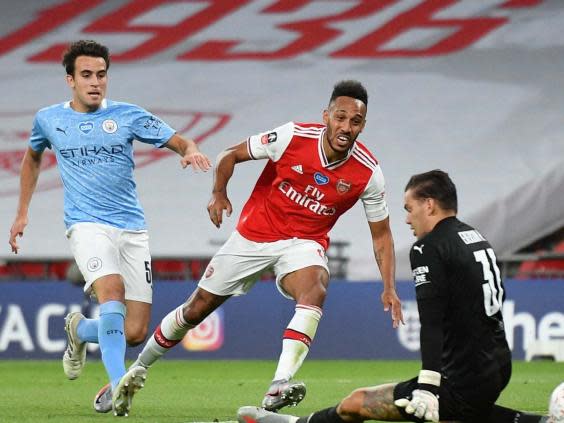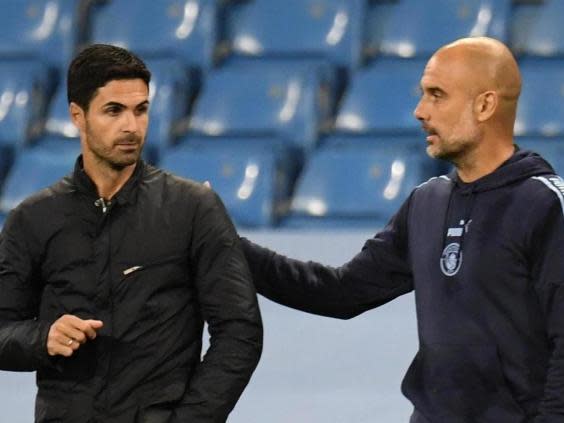Arsenal vs Manchester City result: 5 things we learned as Pierre-Emerick Aubameyang sends Gunners to final

Arsenal produced a mammoth performance to beat Manchester City 2-0 in the FA Cup semi-final on Saturday.
Pierre-Emerick Aubameyang slid in the opening goal with a brilliant, outside-of-the-boot finish after 18 minutes, having earlier squandered a one-on-one chance.
City had half-chances through Raheem Sterling and Kevin de Bruyne, and a long-range strike from Aymeric Laporte, but often their hopes of scoring were short-lived as Arsenal got bodies in the way to clear their lines repetitively.
Aubameyang then sealed the game with a second goal on the breakaway, took book the Gunners’ spot in the final.
Here are five things we learned from the semi-final at Wembley.
Both teams want to play out from the back, but the first half was an exhibition in how not to do so.
Shkodran Mustafi almost gifted Raheem Sterling a goal when losing the ball inside his own area just eight minutes in, which Hector Bellerin played a blind pass across his own penalty area which saw Kevin De Bruyne strike at goal.
It wasn’t just Arsenal, though: Aymeric Laporte played Aubameyang onside after being slow to push up, then gave away possession trying to play out just after the Arsenal goal.
Ederson got in on the act, too, passing straight to an Arsenal shirt and almost allowing Aubameyang or Lacazette to doubled their side’s lead.
Arteta’s starting point

There’s no question that Mikel Arteta has work to do to rebuild the Gunners, particularly when it comes to the deepest two-thirds of the pitch.
But in attack, the rookie manager has a perfect base to build from.
Of course, the big question marks will be over whether he can retain Aubameyang, which is a must, and offload Mesut Ozil, which is similarly important.
But between the Gabonese striker, the work rate and link play of Alexandre Lacazette, the individual ability of Nicolas Pepe and the massively talented youngsters at the club, there’s a whole lot to like and to add to.
The general attitude, commitment and fight shown at the other end of the pitch here was an enormous, incredible improvement—massively out of character for the team compared to the past few years—but there’s no doubt Arsenal’s strength right now is their offensive versatility and quality.
In from the cold and pushing to be key
Arsenal have changed much of the preferred starting lineup during Arteta’s time in charge and even over the last few weeks.
A change of system has been hugely beneficial and paid dividends at Wembley again—but some of the individuals have to receive deserve acclaim, too.
Emi Martinez has shown every game that he is a reliable, safe pair of hands in goal; he may lack the absolute authority of the truly elite, but errors have been few and far between and that’s arguably more important to Arsenal at this stage.
David Luiz and Lacazette are two others who have been hugely criticised and left out for different reasons along the way, but both were genuinely excellent, on and off the ball, in beating Man City.
Arteta will want these displays to be the norm, not the notable exceptions, in the future.
Master and student

Arteta and Pep Guardiola will probably both be glad this game is over and done with, with all the questions about how much one learned from the other, knew about the other’s plans and so on.
Even so, there’s some merit to the train of thought: Arteta will have his own thoughts and approach on management, but part of the reason he went to work with Guardiola was to learn from the best.
It’s natural that he would have some similar traits, and also that he’d know what approach the City manager might take.
Knowing is one thing, stopping it is another—but Arteta’s tactics were excellent here. From the three midfielders being man-marked when the defence had the ball, to the narrow, compact back five to prevent combinations in the half spaces, this was a near-perfect 90 minutes from the Gunners.
That’s essentially what you need to beat a team like City, as well as the odd drop of fortune, and Arsenal had enough of both on the day.
Silverware dreams
City are out of the FA Cup and lost their Premier League title, but still have the League Cup in the trophy cupboard this season and have the Champions League ahead.
They made it clear from the restart that their rotation in the league was about ensuring players were fit for these cup games, so this will be a huge disappointment and their season all hinges on the second leg against Real Madrid.
As for Arsenal, they now have a chance to seal a first piece of silverware in three years, with the FA Cup itself their last trophy back in 2017.
Even a final appearance itself is vindication of Arteta’s progress thus far and an incentive of what more could be achieved, given time and finances.
Read more
Aubameyang strikes twice as Arsenal stun City to reach FA Cup final
Player ratings as Arsenal defeat Man City to reach FA Cup final

 Yahoo Sport
Yahoo Sport 





































